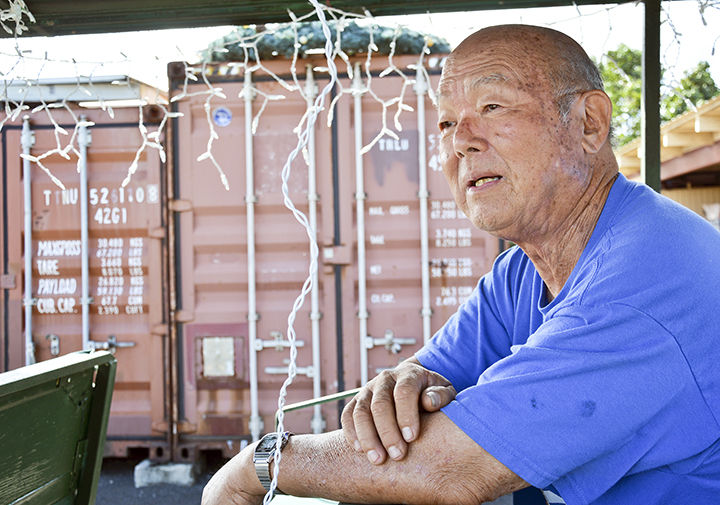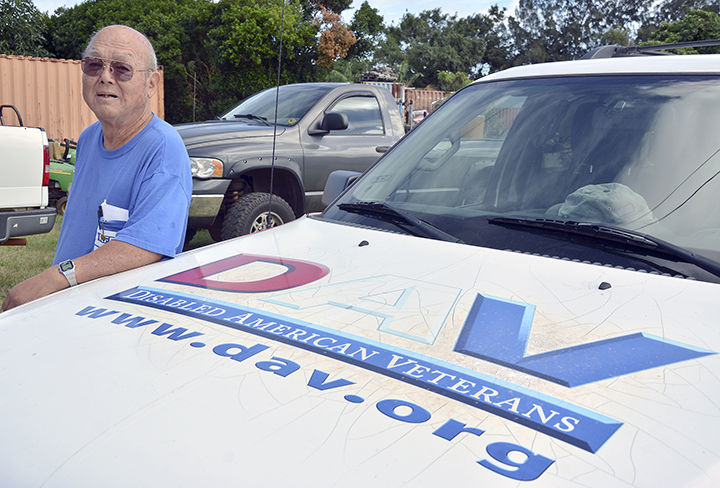LIHUE — When the Japanese planes buzzed Pearl Harbor and dropped their load of bombs, Ed Kawamura was one week shy of his first birthday.
“I never realized the impact of Pearl Harbor until 1995,” the current commander of the Kauai Veterans Council said. “As a divisional commander for the Disabled American Veterans, I had to carry a wreath to the Arizona Memorial. That’s when it hit me.”
“I always had mixed emotions about Pearl Harbor,” Kawamura said. “We lost our culture during that time (World War II), including our language. Then, as a business traveler, I went to Hiroshima and when I visited the museum where the talk was about the atom bomb, I became confused.”
Kawamura said there were the exploits of the 442nd Regimental Combat Team and the 100th Infantry Battalion, but it’s up to the next generation, including himself, to follow in the footsteps of the 442nd, 100th BTN and the Military Intelligence Service veterans.
“Pearl Harbor will live in infamy,” he said. “Its impact is forever. It was a good lesson and people should not forget.”
The Garden Island: Were your dad or other members of your family veterans?
Ed Kawamura: My dad and other people working in the sugar industry were deferred from military duty. The country needed to produce sugar.
My father, Mac Kawamura, worked with Lihue Plantation to develop rat poison to help with the pests in the field. That helped him start M. Kawamura Farm Enterprises which is currently run by three generations of the Kawamura family.
TGI: How did you end up being affiliated with the military?
EK: Growing up in a plantation family, I knew they couldn’t send two kids to school. My older sister was going to college, and after high school, I was undecided about what to do, and thought I could join the military. On July 4, 1958, I joined the fourth All-Hawaii Company. That was before the Vietnam War and I was trained in electronics where the training took me to Germany where I met the missus. The tour ended in 1963, bringing us back to Fort Ord in Georgia where I became part of the signal communication team, following Martin Luther King all over the place.
TGI: When did you get to Vietnam?
EK: It was after tours at Fort Bragg and in Thailand. I was sent into the Vietnam War, being responsible for seven microwave sites because of my electronics and communication training. The good thing about being in communications is you get everything firsthand.
TGI: What do you remember about the Vietnam War?
EK: I was there for just one year. During that time, I lost my cousin, Gary Noboru Kawamura, born to Sakae and Yoshiko Kawamura, Sakae being my dad’s older brother.
We were supposed to meet in Bangkok for Rest and Recuperation. The next thing I know, Gary stepped on a mine.
TGI: How did that experience affect you?
EK: After losing my cousin in Vietnam and knowing how people were being treated coming back from the war, I became involved with the Vietnam Era Veterans on Kauai. Originally, I intended to work for the post office. But being the son of the owner of a family-operated business, I stepped in to volunteer, not expecting to be paid for helping. My dad told me at that time, ‘When you come back here, nobody know you.’ I took that as a challenge and told him, ‘By the time I’m gone, everybody will know the Kawamura family name.’
We have three generations working on the farm. This is why we can do so much for the people.
TGI: You have been driving the Disabled American Veterans van for a number of years. How did you start?
EK: I’ve been doing this for umpteen number of years. You always have to put heart in everything you do. I got involved because there was talk of a transportation network for veterans when I was the commander for the Kauai Veterans Council. Someone donated half the cost of the van, and there were other people who drove before me. But age takes its toll on everyone, and now, I’m the youngest person driving. You’ve got to take care of the people. I’m a firm believer of take care of our own.
TGI: How did you become involved in helping veterans?
EK: It has been a challenge coming back. There was a lot of misfeelings (for Vietnam veterans). I stuck it out and tried to help by learning the system. This ‘learning the system,’ led to achievements benefiting veterans on Kauai, including the construction of the Kauai Veterans Center, with the help of the late Sen. Billy Fernandes, where all veterans are able to come together and stick together.
During my years in the service, I got to meet all of the Secretaries of the Veterans Administration. I got information on how to better help the veterans. In Hawaii, people feel they don’t need to go (register) so they can leave more for other guys.
But they should be getting more. If you see family, relatives and friends of veterans, encourage them to register if they haven’t already done so.
TGI: What are your thoughts on Gen. Eric Shinseki?
EK: Shinseki took the brunt of the smoke. If he hadn’t stepped down, they would still be poking at him — not solving the problems. He is one of the great generals.
TGI: What kind of plans are there to further improve services to veterans?
EK: Life is a challenge, but when you see that one person you helped, every effort is worthwhile. We need veterans to come out and register because we need the numbers to be able to expand programs like the Community-Based Outpatient Clinic, ranked tops in Hawaii. More immediately, I would like to get The Home Depot involved to build a handicap ramp for one of our own. We need to have the community support for the sake of others.
Kauai is a lovely place. There is no place like Kauai to raise children, grow old, and share manao.
Every year, I go to Oahu for the Shinnyo-en Floating Lantern Ceremony. And, like the open house they had recently, I try to be a light for joy, harmony and life.






